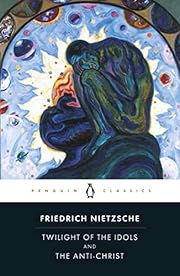

Auf ein Miniaturbild klicken, um zu Google Books zu gelangen.
|
Lädt ... Twilight of the Idols / The Anti-Christ (1888)von Friedrich Nietzsche
 Keine aktuelle Diskussion zu diesem Buch. Friedrich Nietzsche wrote a number of enduring works, with Twilight of the Idols and The Anti-Christ being his last before he went insane. Now this book is the Penguin Classics version of these two works and was printed in 2003 with a new further reading section. R.J. Hollingdale provides the translation and there is an introduction by Michael Tanner. As the book says, the introduction provides historical context for his statements and ideas. Nietzsche is pretty famous so I don’t remember when I first heard of him, though it might have been when I was in school or something. Nietzsche’s philosophy and ideas give off a sort of atmosphere that draws you into them. As a person that doubts the existence of a super-being or entity that has a personal stake in our lives, I can relate to Nietzsche pretty well. That isn’t to say that the work is perfect, however. I suppose my biggest issue with the work is how it is organized. I guess I don’t understand why it jumps around as it does. Maybe I’m wrong, perhaps there is no jumping around and the work is really cohesive and smooth in what it talks about. I would have to read it again to check though. The book opens with Twilight of the Idols. It has a foreword to the work, goes into a number of maxims and aphorisms, and then there is “The Problem of Socrates.” Each chapter is really short and is only around a paragraph in length. If I remember correctly though, I don’t think this is the only work by Nietzsche that does this. Although I suppose with the way it is put forward, it does make it easy to reference a particular paragraph or small amount of text, so maybe that is why he did that. The major theme of Twilight of the Idols fits with most of Nietzsche’s works in that the idea of God is unnecessary and treats humanity as infantile, scraping, and toadying. We are never worthy to even gaze upon the glory that is “God.” Nietzsche argues that humanity is better than that and is mainly disgusted with the idea of Christianity and any other dogmatic system that forces one to go against their nature. Nietzsche piles on the vitriol and disregards the words of his critics. He also has a bad habit of trailing off his sentences with ellipses, though I think he might be making a point. It continues with The Anti-Christ. As I mentioned, I believe this was his last completed work before he was institutionalized. There is so much quotable material packed into this slim volume. It sums up his ideas quite succinctly. The one I especially recognized was the second paragraph. I think a portion of it was quoted in one of the Civilization Games. All in all, I think Nietzsche was courageous in holding to his ideals and whatnot, especially when it went against the Status Quo. keine Rezensionen | Rezension hinzufügen
Gehört zu Verlagsreihen
Nietzsche's sustained and often vitriolic attack on the morality and beliefs of his time, in particular those of Hegel, Kant and Schopenhauer. Twilight of the idols is a "grand declaration of war" on reason, psychology and theology that combines highly charged personal attacks on his contemporaries with a lightening tour of his own philosophy. It also paves the way for The Anti-Christ, Nietzche's final assault on institutional Christianity. Keine Bibliotheksbeschreibungen gefunden. |
Aktuelle DiskussionenKeineBeliebte Umschlagbilder
 Google Books — Lädt ... Google Books — Lädt ...GenresMelvil Decimal System (DDC)190Philosophy and Psychology Modern western philosophy Modern PhilosophersKlassifikation der Library of Congress [LCC] (USA)BewertungDurchschnitt: (4) (4)
|
||||||||||||||||||||||||||||||||||||||||||||||||||||||||||||||||||||||||||||||||||||||||||||||||||||||||||||||||||||||||||
Take time to digest each of the thoughts collected in Twilight of the Idols and allow them to simmer. Really focus on what it says and the different interpretations available.
In the Anti-Christ, I found humor personally; though not many readers will. Some will be highly offended and I find that even funnier. Chastising religion through philosophical means, this short essay collects thoughts like butterflies and then smashes them - with a hammer, as the title suggests.
Nietzche is metaphorically hitting the reader over the head with the proverbial hammer and asking them to wake up to look at the world around them.
I recommend it for folks who are looking for philosophy books to read but this is not a first-timer style read. If you have some experience with Nietzche, excellent; if not, keep this for later.
**All thoughts and opinions are my own.** (